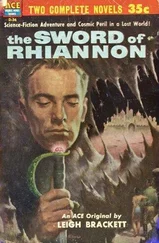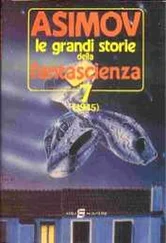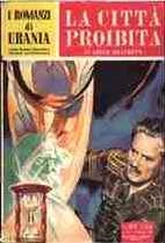Esau shook his head. “He came in with us. Said he lost his key. I suppose he’s got some work to do.”
Jones said, “Erdmann won’t be happy. Oh well. Nobody told me to keep him out, so my conscience is clear.” He grinned. “Let me know what happens, huh?”
“He was drunk the other night,” said Len. “I don’t reckon anything will happen.”
“I hope not,” said Esau. “I want to see that brain work.”
They left their coats in a locker room and hurried on down to the next level, past the picture of Hiroshima, past the victims with their tragic impassive eyes. And the voices reached them from beyond the door.
“No, I am sorry, Frank. Please let me say it.”
“Forget it, Julio. We all do things. Forget it.”
“Thank you,” said Gutierrez, with immense dignity, with great contrition.
Len hesitated outside, looking at Esau, whose face was a study in violent indecision.
“How does she go?” asked Gutierrez.
“Fine,” said Erdmann. “Smooth as silk.”
Their voices fell silent. Len’s heart came up into his throat and stuck there, and a cold cord was knotted through his belly. Because there was now another voice audible in the room, a voice he had never heard before. A small, dry, busy whisper-and-click, the voice of Clementine.
Esau heard it, too. “I don’t care,” he whispered. “I’m going in.”
He did, and Len followed him, walking softly. He looked at Clementine, and she was no longer sleeping. The many eyes on the panel board were bright and winking, and all through that mighty grid of wires there was a stir and a quiver, a subtle pulse of life.
The selfsame pulse, thought Len, that beats down there below. The heart and the brain.
“Oh,” said Erdmann, almost with relief. “Hello.”
The high-speed printer burst into a sudden chatter.
Len started violently. The eyes on the panel board winked as though with laughter, and then it was all quiet, all dark again, with the exception of a steady light that burned as a signal that Clementine was awake.
Esau sucked in his breath. But he did not speak because Gutierrez beat him to it.
He had taken some papers out of his pocket. He did not seem to be aware that anyone was there but Erdmann. He held the papers in his hands and said, “My wife felt that I shouldn’t come here and bother you today. She hid my key to the safety gate. But of course this was far too important to wait.”
He looked down at the papers. “I’ve gone over this whole sequence of equations again. I found where the mistake was.”
Something tightened and became wary behind Erdmann’s face. “Yes?”
“It’s perfectly plain, you can see for yourself. Here.”
He shoved the papers into Erdmann’s hand. Erdmann began to scan through them. And now there came into his face an acute discomfort, a sorrow, a dismay.
“You can see,” said Gutierrez. “It’s plain as day. She made a mistake, Frank. I told you. You said it wasn’t possible, but she did.”
“Julio, I—” And Erdmann shook his head from side to side and glanced in desperation at Len, and found no help there, and began to shuffle again through the papers in his hands.
“Don’t you see it, Frank?”
“Well, Julio, you know I’m not mathematician enough—”
“Hell,” said Gutierrez impatiently, “how did you get to be an electronics engineer? You know enough for that. It’s all written out plain. Anybody should see it. Here.” He fumbled at the papers in Erdmann’s hands. “Here, and here, you see?”
Erdmann said, “What do you want me to do?”
“Why, run it through again. Correct it. Then we’ll have the answer, Frank. The answer.”
Erdmann moistened his lips. “But if she made a mistake once she might do it again, Julio. Why don’t you get Wentz or Jacobs—”
“No. It would take them all winter, a year. She can do it right now. You’ve tested her. You said so. You said she was smooth as silk. That’s why I wanted it to be today, while she’s still fresh and unused. She can’t possibly make the same mistake again. Run it through.”
“I—well,” said Erdmann. “Well, all right.”
He went over to the input mechanism and began to transfer onto the tape. Gutierrez waited. He still had his heavy outdoor clothes on, but he did not seem to feel that he was hot or uncomfortable. He watched Erdmann, and from time to time he glanced at the computer and smiled and nodded, like a man who has caught someone else in an error and thereby vindicated himself. Len had withdrawn into the background. He did not like the look on Erdmann’s face. He began to wonder if he should go, and then the lights on the panel began to glow and wink at him, and the dim voice hummed and murmured, and he was as fascinated as Esau and could not go.
He was startled when Erdmann spoke to them. “I’ll be free in a bit. Then I’ll answer your questions.”
“Would you rather we’d come back later?” asked Len.
“No,” said Erdmann, glancing at Gutierrez. “No, you stick around.”
Clementine pondered, mumbling softly. Apart from that it was very still. Gutierrez was calm, standing with his hands folded in front of him, waiting. Erdmann fidgeted. There was sweat on his face and he kept wiping it off and running his hand over his mouth and looking at Gutierrez with an expression of utter agony.
“I think there were some circuits we missed on the overhaul, Julio. She hasn’t been fully checked. She might still—”
“You sound like my wife,” said Gutierrez. “Don’t worry, it’ll come out.”
The output printer chattered. Erdmann started forward. Gutierrez knocked him out of the way. He snatched the paper out of the printer and looked at it. His face darkened, and then the color left it and it was gray and sick, and his hands trembled.
“What did you do?” he said to Erdmann. “What did you do to my equations?”
“Nothing, Julio.”
“Look what she says. No solution, recheck your data for errors. No solution. No solution—”
“Julio. Julio, please. Listen to me. You’ve been working too long on this, you’re tired. I put the equations just as they were, but they—”
“They what? Go on and say it, Frank. Go on.”
“Julio, please,” said Erdmann, with a terrible helplessness, and put out his hand to Gutierrez as one does to a child, asking him to come.
Gutierrez hit him. He hit him so suddenly and so hard that there was no way and no time to dodge the blow. Erdmann stepped back three or four paces and fell down, and Gutierrez said quietly, “You are against me, both of you. You had it arranged between you, so that no matter what I did she would never give me the right answer. I’ve thought of you all winter, Frank, in here talking with her, laughing, because she knows the answer and she won’t tell. But I’m going to make her tell, Frank.”
He had stones in his pockets. That was why he had kept his coat on, in the warmth of Bartorstown. He had a lot of stones, and he took them out and threw them one by one at Clementine, shouting with a wild joy, “I’ll make you tell, you bitch, you lying bitch, deceitful bitch, I’ll make you tell.”
Glass on the panel board crashed and tinkled. Circuit wires twanged. One of the big glass tanks that held a part of Clementine’s memory burst open. Frank Erdmann scrambled up unsteadily from the floor, yelling for Gutierrez to stop, yelling for help. And Gutierrez ran out of stones and began to beat on the panel with his fists and kick it with his boots, screaming, “Bitch, bitch, bitch, I’ll make you tell, you’ve got my life, my mind, my work stored up in you, I’ll make you tell!”
Erdmann was grappling with him. “Len. Esau, for God’s sake, help me. Help me hold him.”
Читать дальше












